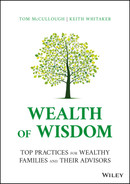SECTION 6
RAISING THE RISING GENERATION
Most parents see their children as their greatest gift, and accordingly look at the task of raising happy, independent young adults as their most important work. At the same time, the special risks and concerns that raising children amid significant wealth brings cause many parents to doubt themselves, procrastinate taking action or communicating, and miss opportunities for passing on important life lessons.
The chapters in this section aim to resolve this dilemma, as much as possible. We begin with two chapters devoted to instituting new “rituals” in your life with your children.
In the first, Joline Godfrey describes steps that parents can take to introduce discussion of responsibilities and maturity into a “pre-birthday” ritual for each child. Starting even with young children, parents can connect the benefit of getting presents with the importance of taking on new responsibilities as a child ages. It is a ritual that can resonate powerfully when children are faced with receiving much larger gifts as part of parents' estate planning.
Next, Andrew Doust outlines a college “sending” ritual that families can use to mark the special transition from life at home to life at college, which for many children marks the true beginning of adult life. This ritual involves inviting the young- adult child to reflect on what he or she wants to get out of the college experience and creating an agreement of expectations of what the college student will do and communicate with parents in exchange for the “scholarship” of family funds that are covering tuition. As with the pre-birthday ritual, this ceremony aims to connect the opportunity that wealth affords with responsibility, to militate against entitlement.
Much of the work of effective parenting takes place through offhand conversations that make the most of “teachable moments.” But as the two prior chapters show, intentional communication can be very powerful. This is the point of the next chapter as well, in which Bo and Suzanne Huhn relate the lessons they imparted to their grandchildren, using a thoughtful plan of written notes, humorous conversations, structured family dialogues, and video testimony. Over the course of years this intentional process of imparting “life lessons” deeply shaped their grandchildren's character.
In many families, raising the rising generation also involves the practical consideration of whether members of the rising generation will join the family business. The next two chapters take up this dynamic, first from the standpoint of the rising generation member who is considering this choice and then from the standpoint of the senior family member who is trying to prepare his or her successors to succeed.
In the first, Josh Baron and Rob Lachenauer offer a checklist for the rising generation family member who is considering joining the family business. This list prompts reflections on everything from the young adult's motivation, to past experience, to the nature of the ownership structure, to the alignment of the young adult's goals with the current owners' and managers', and much more. The results of this self-assessment will help the prospective member of the family business decide whether, and at what speed, and with what support, to move ahead in this choice.
In the next chapter (reprinted from the first Wealth of Wisdom volume), Dean Fowler offers guidance to family business leaders on how to mentor their successors and prepare them to succeed. The checklist for these mentors includes ensuring that successors have developed their own sense of independence, that the family has enhanced its ability to talk about difficult topics, that there is a transition strategy in place that (among other things) addresses the liquidity needs of various family members, and that the successors have developed their own ability to assess, take, and manage financial risk.
If there is one ability that is central to long-term family success, it is the ability to communicate effectively among generations. The greatest obstacle to this communication very often is the belief that it has taken place. As a result, families commonly need to make time to foster intergenerational communication in an intentional manner. In the final chapter in this section, Susan Massenzio offers a simple but extremely powerful exercise for structuring an “intergenerational dialogue,” which family members can use to share their most important messages with each other, to learn from each other, and to practice communicating effectively within each generation as well.
